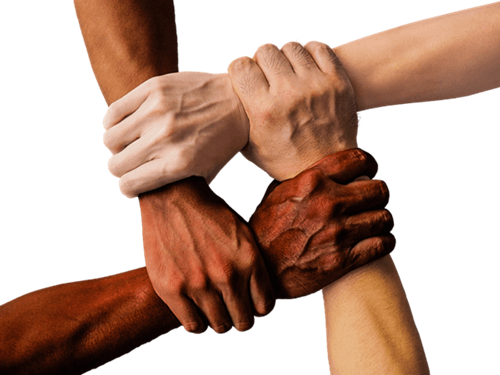Despite Ireland being known for cultural diversity, promoting equality can be difficult in the workplace. Even in society today, discrimination and equality still remain growing concerns.
As an employer, you have a duty of care to protect and support your employees. You should also create an equal, diverse, and inclusive work environment as this will increase morale and your business's reputation.
If employees don't receive equal opportunities, they could face employment tribunals and hefty compensation fees.
In this article, we'll explain what equality, diversity, and inclusion are; why it's important; and how to promote them at work.

What is equality in the workplace?
Equality in the workplace means equal job opportunities and being fair to employees and job applicants.
Everyone should be treated the same and not unfairly, because of reasons protected by discrimination law.
Equality in the workplace encourages the hosting of race, religion, sexual orientation, disability, age, sex, gender, the traveller community, family status, pregnancy and marital or civil status.
Equality, diversity and inclusion are often confused. A diverse workplace isn't always inclusive, nor is an inclusive workplace always diverse.
What is gender equality?
Gender equality refers to the equal rights, responsibilities and opportunities of men and women.
For example, gender equality in the workplace could mean being paid the same salary for equal work, regardless of gender.

What is diversity?
Diversity is any dimension that can be used to distinguish groups and people from one another.
Diversity refers to the range of people in your workforce. This might mean employees of different ages, religions, disabilities - for both men and women.
Due to the range and variety of people in your workforce, discrimination can occur from time to time.
To prevent bullying, harassment or discrimination, you need to make sure:
- Your managers and workforce understand what is protected by discrimination law.
- You understand what's expected of discrimination law at work.
- You make changes if what's expected isn't happening.
- You understand how diversity can be beneficial to your business.

What is inclusion?
Inclusion in the workplace means everyone feels valued. It also allows employees to feel safe at work to:
- Produce new ideas.
- Knowing raising issues to managers is encouraged.
- Try new ways of doing things.
Inclusivity can help lower the risk of bullying, harassment and discrimination.
In the workplace, inclusion includes all sorts of backgrounds and environments. Sometimes, employees may be discriminated against due to their education.
Can higher education be discriminated against?
Higher education shouldn't be discouraged at work.
If some workers attended university to benefit from higher education, everyone should support that and provide inclusive environments.

Why are equality, diversity and inclusion important?
Businesses that strive to maintain equality in the workplace can reap a range of benefits.
For example:
- Creating positive working relationships.
- Increased productivity.
- Staff performance increases.
- More appeal from clients or customers.
- A greater representation of your brand.
Equality, diversity and inclusion legislation
Under the Employment Equality Act 2015 in Ireland, employees shouldn't be treated less favourably than another person in a similar situation because of who they are.
This includes both direct and indirect discrimination. The Employment Equality Act 2015 applies to employees facing different forms of discrimination.
This includes discrimination through:
- Job advertisements.
- Recruitment.
- Training.
- Work experience.
- Promotion.
What are protected characteristics?
Discrimination in the workplace is one of the biggest tribunal claims raised by workers.
Although equality, diversity and inclusion are different things, your business needs to comply with the Employment Equality Act 2015.
The protected characteristics are:
- Age.
- Disability.
- Family status.
- Gender.
- Membership of the Traveller community.
- Civil status.
- Race.
- Religion.
- Sexual orientation.
Discrimination on the grounds of any of these characteristics is illegal unless discrimination is proved necessary.

How to promote equality, diversity, and inclusion at work
As an employer, you should always promote equality, diversity, and inclusion in the workplace.
There are a few methods to help you promote them in your business:
Offer training
Training is vital in supporting equality, diversity, and inclusion. It enables you to raise awareness and provide an understanding across a range of topics such as disability, family status, religion, and sexual orientation.
Prevent unconscious bias at work
Unconscious bias can be difficult to tackle, especially as it's part of human nature.
It refers to having social stereotypes against one person or group. This could lead to certain people receiving benefits and others being victimised.
Beware of indirect discrimination at work
At work, there may be a lot of direct and indirect discrimination. You should eliminate any policies that indirectly disadvantage certain people or groups.
For example, if a requirement at work is to be clean-shaven, this could discriminate against workers who have a beard due to their religion.
Create an equality, diversity, and inclusion policy
A policy will allow you to promote workplace equality, diversity, and inclusion. A policy should outline your rules and regulations for your employees and business to follow.
Regulations for your equality policy could include:
- Treating everyone fairly.
- Conduct and behaviour.
- Employment law and breaches.
- Outline procedures for resolving problems.
It's advised to also have an action plan. This will outline steps to ensure your policy is used daily. Steps could include training programs, procedures, and managing issues.
Everyone in your business should acknowledge the importance of equality, diversity, and inclusion in all areas of work. For example, recruitment, training, and working arrangements.
Take a more proactive role
Taking a proactive role will allow you to set benchmarks for policies and procedures. This can also help you reach aims and targets throughout your business.
By staying active, your employee engagement will increase. This is because they will value your approach and see you're trying to make a difference.
Create an equal and diverse recruitment process
Recruitment and selection procedures can involve a range of colleagues, so it's vital everyone understands their responsibilities. Promoting diversity and equality should be central to your process.
Pay attention to the language in job adverts, descriptions and application forms. A clear statement of commitment to equality, diversity and inclusion can help reassure applicants they won't be excluded on the grounds of a protected characteristic.
The final decision must be firmly based on the applicant's ability to do the job.

Manage equality, diversity and inclusion with Peninsula
As an employer, you can benefit from having clear communication on equality, diversity and inclusion.
Strive for an equal and diverse working environment, as this alleviates any discrimination or exclusion.
If mistreated or ignored, you could face discrimination claims or even tribunal hearings alongside hefty compensation fees.
Peninsula Ireland gives clients 24/7 advice and support on specialist guidance on equality, diversity and inclusion. Our HR specialists can help you manage legal obligations, as well as help you create an equal working environment in your business.
Want to find out more? Book a free consultation with one of our HR consultants. Contact us on 1890 252 923.
